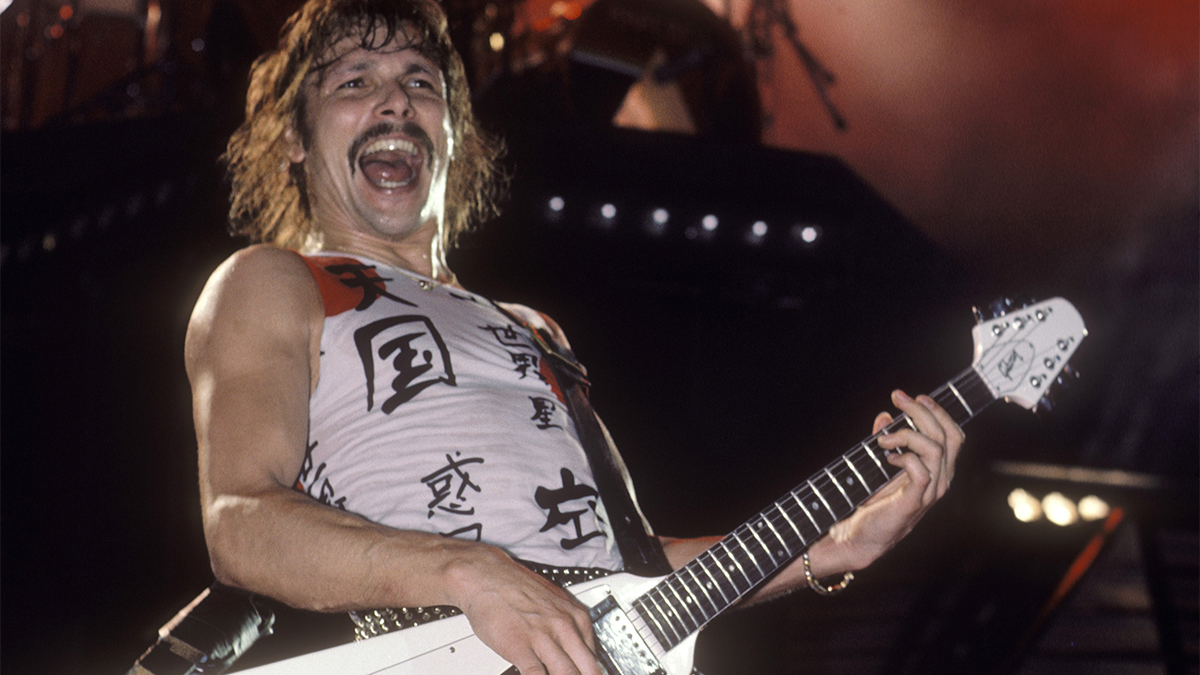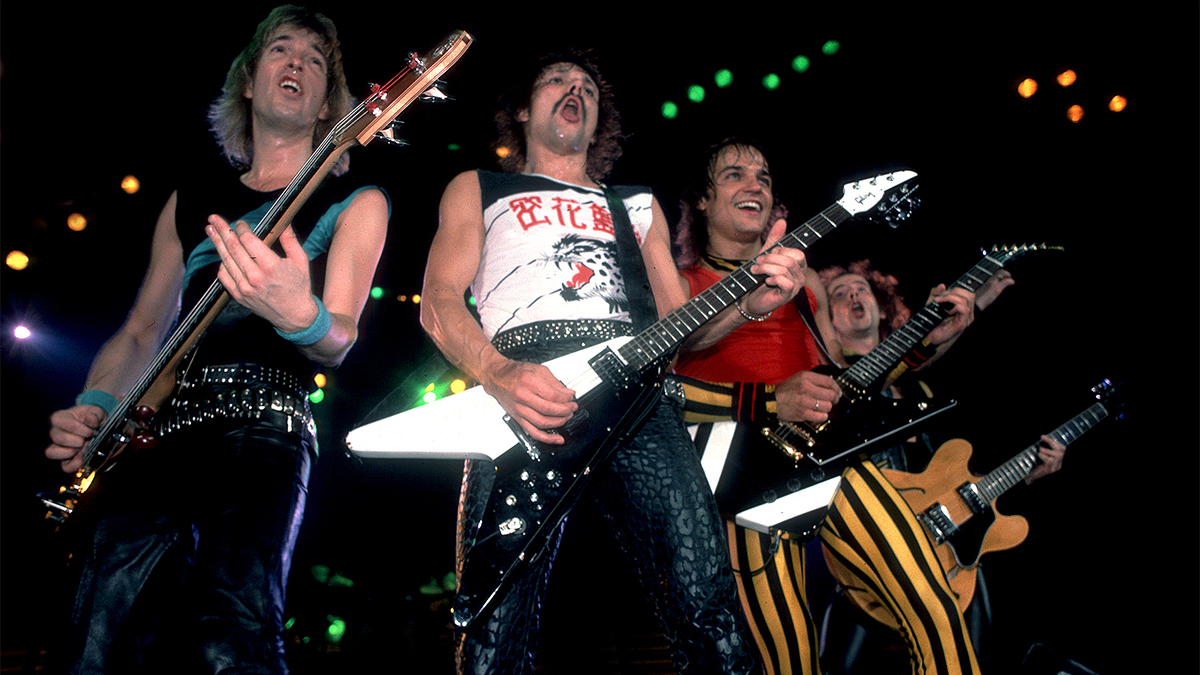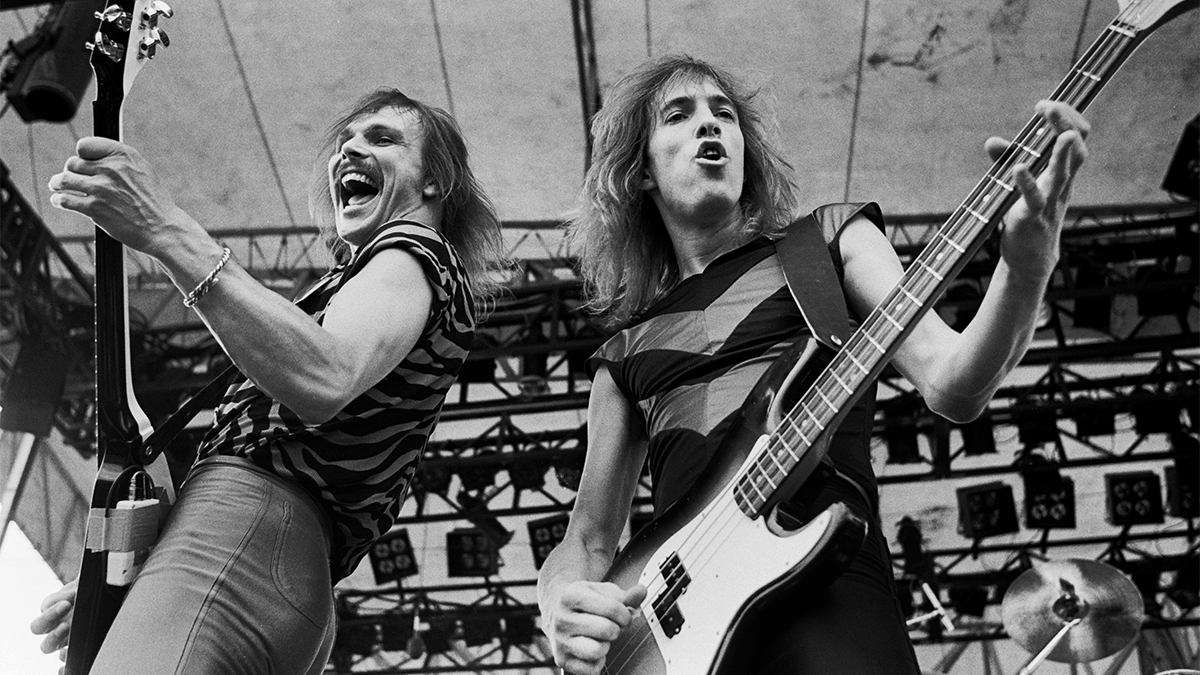“He’d already refused an offer from Eric Clapton.” Rudolf Schenker reveals the story behind Scorpions’ “Rock You Like a Hurricane” and the guitar Slowhand couldn’t own
The guitarist says the 1984 hit went through nine revisions before it was ready to record

In the list of all-time rock radio anthems, Scorpions’ “Rock You Like a Hurricane” ranks at the very top. Released in 1984 as the lead single from Love at First Sting, it gave the band their biggest American hit up to that point and cemented their status as one of the premier hard-rock bands in the world.
Guitarist and founding member Rudolf Schenker knew that they had set the bar high with Blackout, released two years earlier, which had given them their first U.S. top 10 album.
“I wouldn’t say that we were under pressure so much as that it was more like getting kicked in the ass,” he says with a laugh. “We knew that we always wanted to do things better than we had before: better tours, better albums and better songs. We were confident going into the studio to make Love at First Sting.”

Written by Schenker and Scorpions’ singer/lyricist Klaus Meine, “Rock You Like a Hurricane” went through a number of re-writes before everything coalesced. “I had the music for it,” Schenker says. “At that time I would come up with the music, then make a demo to give to Klaus and he’d come up with the lyrics.
"Perhaps the words wouldn’t always be right immediately, but with ‘Rock You Like a Hurricane’ we had to rewrite them nine times. I had an idea for what the chorus should sound like — not the words but sounds — kind of like [sings] ‘na na na na,’ which was the ‘rock you like a’ part.”
While Meine had no trouble coming up with lyrics for the chorus, the verses — which include raunchy lines like “The bitch is hungry, she needs to tell, So give her inches and feed her well” — were written with the help of the group’s drummer Herman Rarebell.
“Klaus had the words for the chorus, and he got together with Herman, who was very good at coming up with words that had double meanings. That was how we came up with those verses that were, perhaps, a little on the edge. The funny thing is that when the record came out, I always had girls telling me how much they liked that song, so they could obviously see we weren't taking ourselves too seriously.”

The band started recording Love at First Sting at Polar Studios in Stockholm, with Jimmy Bain on bass guitar and Bobby Rondinelli on drums, deputizing for bassist Francis Bucholz and Rarebell, who were suffering from health issues. “We’d been touring so much and working so hard, and I think things had taken their toll.” An opportunity to co-headline the Metal Day at the US festival in California in 1983, with Van Halen, dramatically changed the band’s plans.
“We had to pause to play at the US festival and we did a two-week tour before that to warm up, with Quiet Riot supporting us,” Schenker recalls. “It was a fantastic event. We played the best show we had ever done, and it really energized us, particularly Herman and Francis. We decided that we should make the most of that energy and start the album again from scratch, which we did in our producer Dieter Dierks’ studio in Germany. It was all digital and very advanced for that time.”
Schenker says the band knew “Rock You Like a Hurricane” needed “something extra,” so the group sent it to be mixed at the Power Station in New York City. “That was where the idea for the backward echo parts came on the verse after the solo,” he says. “That took the song up another level.”

Schenker can remember exactly what electric guitar he used to record “Hurricane.” “I was using a 1958 Gibson Flying V, which I’d bought from Alex Conti, who was in a German band called Lake,” he says. “I’d been trying for years to get him to sell it to me — he’d already refused an offer from Eric Clapton. When I got it, it was the best-sounding guitar that I’d ever had — it was unbelievable. I’ve since managed to buy four more 1958 Flying Vs, but of the five that I own, that one is the best. I played it through a Marshall amp, which is what I always used for recording or live work at that time. Of course, I wouldn’t tour with that guitar. I was too risky”
Released as a single on January 30, 1984, “Rock You Like a Hurricane” reached number 25 on the Billboard Hot 100 chart. It went on to become the group’s signature song in the U.S. and opened the doors to a wider audience.
But as successful as Love at First Sting was, Schenker has one regret. “We were on fire for that record, which is why it is such a strong album,” he says. “I think, though, that perhaps I wouldn’t have recorded it digitally. The technology wasn’t as great as it is now, which makes it sound a little bit clinical. I think the magnetism of the tape was missing, and that gives the guitars a warmer sound, so that is all that I would change.”
Understandably, his love for the song hasn’t diminished 40 years later. “You never lose the excitement if you play from your heart as a musician,” he says. “All we wanted to do was get out of Germany and show the world that there is another generation from Germany coming from rock and roll with guitars, not to make war with tanks.
“Our philosophy has always been ‘peace, love and rock and roll.’ That is why we mix up the songs on our records. We have ‘Still in Love With You’ for love, ‘Wind of Change’ for peace, and ‘Hurricane’ for rock and roll.”
Get The Pick Newsletter
All the latest guitar news, interviews, lessons, reviews, deals and more, direct to your inbox!
Mark is a freelance writer with particular expertise in the fields of ‘70s glam, punk, rockabilly and classic ‘50s rock and roll. He sings and plays guitar in his own musical project, Star Studded Sham, which has been described as sounding like the hits of T. Rex and Slade as played by Johnny Thunders. He had several indie hits with his band, Private Sector and has worked with a host of UK punk luminaries. Mark also presents themed radio shows for Generating Steam Heat. He has just completed his first novel, The Bulletproof Truth, and is currently working on the sequel.
"This 'Bohemian Rhapsody' will be hard to beat in the years to come! I'm awestruck.” Brian May makes a surprise appearance at Coachella to perform Queen's hit with Benson Boone
“We’re Liverpool boys, and they say Liverpool is the capital of Ireland.” Paul McCartney explains how the Beatles introduced harmonized guitar leads to rock and roll with one remarkable song











